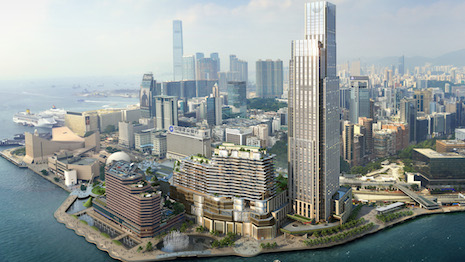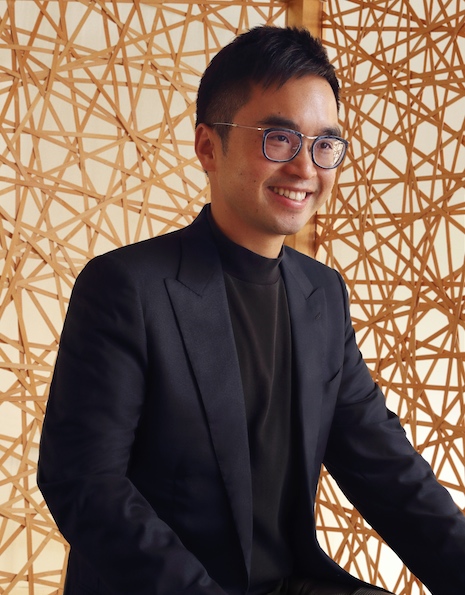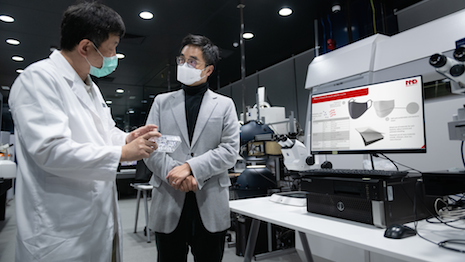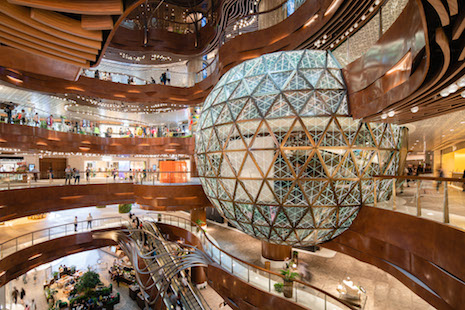 Victoria Dockside, the $2.6 billion, 3-million-square-foot global art and design district comprising K11 Musea, K11 Artus, K11 Atelier and the Rosewood Hong Kong hotel, was conceived and created by Adrian Cheng in collaboration with 100 creative powers. Image courtesy of New World Development
Victoria Dockside, the $2.6 billion, 3-million-square-foot global art and design district comprising K11 Musea, K11 Artus, K11 Atelier and the Rosewood Hong Kong hotel, was conceived and created by Adrian Cheng in collaboration with 100 creative powers. Image courtesy of New World Development
Adrian Cheng is the scion of a well-regarded family in Hong Kong and Chinese circles. He is the CEO of New World Development, founder of K11 and owner of the Rosewood Hong Kong hotel.
As such, Mr. Cheng, similar to his peers, has faced the biggest challenge of his career with the prevalence of the COVID-19 coronavirus outbreak in China and Hong Kong, both markets where he is heavily invested in targeting affluent and ultra-affluent consumers.
“We adapted very quickly and reinvented our business model in order to cater to the evolving needs of today’s consumers, from developing new digital platforms and experiences to introducing unique opportunities for people to virtually engage with their peers and passions,” Mr. Cheng said.
In this detailed interview, Mr. Cheng spells out his vision for his companies and how they are adapting in challenging circumstances in China and Hong Kong, as well as how luxury marketers should learn from Asia. Please read on:
 Adrian Cheng is CEO of New World Development, founder of K11 and owner of the Rosewood Hong Kong hotel. © Tim Wong
Adrian Cheng is CEO of New World Development, founder of K11 and owner of the Rosewood Hong Kong hotel. © Tim Wong
How would you describe 2020 so far?
2020 has no doubt been one of the most emotionally and physically challenging years in recent history. But where many see crisis, I see opportunity.
As a business leader, I know I have a role in shaping a better tomorrow in Hong Kong and beyond.
Guided by a mission of Creating Shared Value (CSV), which aims to connect business success, social progress and environmental conservation so that individuals, companies and communities can thrive in mutuality, I and my colleagues at New World Development are always looking to find innovative solutions to the most pressing issues we face as a global population. This year, that issue has obviously been COVID-19.
I could never have predicted the emergence or outcome of this pandemic, but I can say that I am proud of how quickly and effectively my team responded to it.
Since the initial outbreak, our team has not only been able to provide protection to those in need through our mask making and distribution efforts, but we’ve also gained valuable insight and expanded our thought processes so we may be better prepared for the future.
As humans, we are much more resilient than we might think. When the world tests us, we must step up to the challenge. And I’m proud of New World Development and our global partners and stakeholders for doing just that.
From a personal standpoint, what has stood out to you from the world’s response to COVID-19?
When the first wave of COVID-19 hit China in January, I witnessed so many members of my greater community fall victim to the outbreak, with little access to the essential gear they needed to property protect themselves and others.
Then, as the pandemic spread globally in the following months, I saw the same issues arise in overseas communities.
This virus has revealed how truly interconnected we all are around the world, as well as how powerful we can be when we support and protect one another.
What truly stood out to me was the agile efforts of so many individuals and corporations who have offered their help wherever possible.
From retired healthcare professionals, to essential workers, to fashion brands pivoting production to create masks and hand sanitizer, witnessing people from across the world come together to protect one another has really provided a bit of light amidst the darkness of this pandemic.
As a result, I felt inspired to create our global charitable platform, #LoveWithoutBorders, to further communicate the responsibility we all have to one another, especially during difficult times.
Leveraging our group’s expertise, resources and network, the campaign was created to provide essential support and safety equipment to those most affected by COVID-19 around the world, no matter their culture, background, gender or ethnicity.
To date, the initiative has donated 10 million-plus medical face masks to the immediate and global communities most in need, including half-a-million masks to UNICEF to offer essential protection to children and healthcare workers residing in the world’s refugee camps. And we will not stop there.
We recently launched four medical face mask production lines to keep inventory strong and are also working to develop the next generation of affordable, antibacterial and antiviral face masks.
We’ll continue to leverage our resources and lend our support for as long as it takes.
 New World Development is collaborating with biomedical company Master Dynamic on the research and development of the application of NanoDiamonds technology to make the next generation of antibacterial and antiviral masks. Seen here on right, Adrian Cheng, CEO of New World Development. Image courtesy of New World Development
New World Development is collaborating with biomedical company Master Dynamic on the research and development of the application of NanoDiamonds technology to make the next generation of antibacterial and antiviral masks. Seen here on right, Adrian Cheng, CEO of New World Development. Image courtesy of New World Development
You have contributed toward COVID-19 relief. What has your focus been in each of your businesses?
My biggest focus for each of my businesses has been to keep employees safe, while working to identify and implement innovative strategies to provide support and solutions to the general public during this critical time.
The past several months have certainly posed their fair share of challenges to our businesses, but I’m glad to see that we have a very unified team and the morale of our staff is still very strong.
We adapted very quickly and reinvented our business model in order to cater to the evolving needs of today’s consumers, from developing new digital platforms and experiences to introducing unique opportunities for people to virtually engage with their peers and passions.
Thanks to the creativity and dedication of our versatile staff, we have done well weathering the crisis at this point, and we’re hopeful that we’ll continue to make strides towards complete recovery.
China seems to have bounced back quicker than the rest of the world from the coronavirus fallout. What can other countries learn from how China handled the pandemic?
We responded very fast as a community, really springing into action at the first sign of trouble.
Hospitals were built in a matter of days, people stayed home, they wore masks, they listened to trained professionals. And while here in Hong Kong we are currently experiencing another outbreak of the virus, we’re applying key learnings from the first episodes to ensure we effectively contain these new cases and avoid another widespread outbreak.
My advice to other countries battling the virus is take this seriously and trust the facts.
We’ve seen countless studies validate the effectiveness of masks and social distancing, and we must be not get complacent and instead continue to be vigilant in our approach.
How we tackle this today will completely affect the outcome of tomorrow – these little actions make a big impact when we all work together and follow them.
As a global community, I believe we owe it to one another to do what we can to keep each other safe.
What about Hong Kong – what outlook do you see for this market? After all, it is so key to luxury brands and affluent individuals?
Hong Kong is incredibly resilient and resourceful. I truly have full confidence in the long-term future of our city.
Tourism accounts for about 5 percent of retail sales in Hong Kong, so travel restrictions have most definitely affected the overall luxury economy here in the same way they have for the rest of the world.
But we’ve also witnessed such a strong eagerness to get back to business amongst our locals in the past couple of months, with K11 Musea seeing luxury retail sales grow by 219 percent in May-June versus February-March of this year.
We must stay positive and remember that our city has overcome incredible obstacles in its history.
While it’s only natural to worry, I know we’ll bounce back from this, too and continue to thrive as a global financial hub and powerful center of business and creativity.
Let us talk about your different businesses: what is the outlook for your real estate business, and how are you steering its future?
As part of New World Development’s mission of Creating Shared Value, the main priority within our real-estate endeavors is to create properties that allow for our patrons and planet to thrive as one.
Property development is a big contributor to climate change, so as a leader in the industry, I feel it is my duty to set a responsible, more sustainable standard for fellow corporations to follow, and also to inspire the next generation of thought leaders to incorporate sustainable practices into their own lives, as well.
By introducing impactful production methods and energy sources within our own projects, as well as educational opportunities for the people that they reach, we hope to not only reduce our group’s energy and carbon intensity by 50 percent by 2030, but further pave the way for an accessible and conscious public shift toward prioritizing wellness, sustainability and healthy living.
With that said, I’m incredibly eager to unveil New World Development’s largest residential project to-date later this summer.
More details are to be shared very soon, but I can say that this Hong Kong development perfectly encompasses our mission of Creating Shared Value to provide an ahead-of-its-time living experience unlike any the world has ever seen below.
What about Rosewood Hotels & Resorts? The properties have opened, but there is no doubt that travelers may take a while to return to their normal travel routines.
There is no denying that hospitality was one of the industries hardest hit by the pandemic.
With shutdowns and stay-at-home orders issued around the world, and in an effort to contain the further spread of the virus, many of our hotels temporarily closed their doors.
That said, it’s been inspiring to see how strong and adaptive the industry truly is.
Across the globe, the teams at each of our properties quickly sprung into action to pivot their operations and support their communities in their time of need.
In Hong Kong, our PentaHotel was the first local property to offer free stays for healthcare workers, and countless hotels and resorts within the Rosewood Hotel Group portfolio donated and delivered meals and goods to essential personnel and frontline responders.
As a group, we also launched the Rosewood Raise Relief Fund to assist our associates most affected by the COVID-19 pandemic, and our individual brands activated comprehensive recovery strategies to ensure that our properties would exceed the new set of travel preferences and priorities that emerged in response to the pandemic.
For example, Rosewood Hotels & Resorts introduced Commitment to Care, a brand-wide health and safety program providing heightened standards for hygiene, cleanliness and care, to ensure that when guests were ready to travel once more, our properties would be ready to welcome them with the safest and most comfortable experience.
Collectively, all of these efforts have been instrumental in Rosewood’s global recovery, and I’m pleased to share that as of today, over 60 percent of our properties have reopened, with the remainder slated to return over the coming months.
Beyond the influence of our internal initiatives, our strong recovery demonstrates a persistent public appetite for travel.
Right now, the demand is really for domestic leisure travel, and we are seeing travel bubbles in certain regions that have particularly active drive markets.
For example, our hotel in Southern California saw occupancy go up to 50 percent within 10 days of reopening, and has seen a consistent influx of bookings ever since.
People are still eager to explore the world, and while some may be ready to do so earlier than others, we are encouraged by the activity we’ve seen so far and are confident in the industry’s ability to not only get back to the level at which it once was, but to surpass it.
 K11 Musea's Opera Theatre, featuring Gold Ball, reshapes the retail experience with its new cultural-retail concept. Image courtesy of New World Development
K11 Musea's Opera Theatre, featuring Gold Ball, reshapes the retail experience with its new cultural-retail concept. Image courtesy of New World Development
And K11 Musea, what plans do you have to grow that mall/museum hybrid?
From a development standpoint, we plan to build up to 36 K11 projects in 10 cities across Greater China by 2025.
K11 was created to spark passion in young consumers and to showcase how they can leverage the powers of creativity, culture and innovation to bring about impactful change and progress.
So, naturally, as we grow the brand, we are constantly evolving it to ensure that it extends the type of experience that our visitors are looking for.
Likewise for K11 Go and Nature Discovery Park, the crowds seem to have returned. What is the magic formula?
Like K11 Musea, I’d have to say much our success with K11 Go and Nature Discovery Park is due to our dedicated approach to leaning into the preferences and mindsets of the younger generation.
This particular demographic makes up a significant portion of the active consumer base in China, and these individuals are craving different experiences than those once coveted by their parents and grandparents.
Through K11 Go, we’ve created a dynamic, consumer-driven platform which allows for brand storytelling, authentic engagement, and just a more personalized approach to ecommerce overall.
Providing engaging online experiences like those offered through K11 Go is so important in today’s world as, with endless exposure to countless offerings across the Internet, young consumers are in search of exclusive communities that speak to their particular sets of needs while also allowing them to stand apart from the masses.
This same intel was used to carefully curate Nature Discovery Park.
By focusing in on the important topic of sustainable living – a topic that we know these younger generations are passionate about – and bringing it to life through immersive events, workshops and classes, we’ve created a niche space that resonates with this rising consumer base while also providing them with the tools and knowledge to better their lives for years to come.
In your estimate, being a self-made entrepreneur and someone who has seen ups and downs, how do you see the Asian economy evolving versus Europe and North America?
I’m very optimistic about Asia’s post-COVID economy.
As I mentioned, across China, we’re continuing to experience promising “revenge buying” patterns within our local markets. After months at home, consumers are ready to step out and spend.
Along with impressive sales spikes at K11 Musea, we’re witnessing this trend across Greater China as well, especially at K11 Shanghai, which has had a 268 percent increase in sales in May-June versus February-March.
We expect similar consumer behavior will arise in Europe and North America once the initial effects of the pandemic have subsided.
Will COVID-19 reshape consumer behavior, or will it just revert to old patterns as the vaccine is found?
I believe that COVID-19 has accelerated a shift in consumer behavior that has slowly been building for years.
Looking at retail alone, we’ve seen countless brick-and-mortar stores and shopping malls close in recent months.
In most cases, these destinations had struggled with capturing the attention of the modern consumer since before the pandemic took hold. This is because the younger generations that account for a significant portion of today’s buying base are seeking a more holistic and tailored experience that the traditional retail model does not provide.
Now more than ever, as demand for these more personalized, privatized experiences continues to grow due to health concerns around COVID-19, brands must lean into the expanding power and preferences of these young consumers in order to stay top of mind.
I also believe we’ll see a lasting effect on how the pandemic has caused consumers to think about and prioritize health and wellness.
Whether it be the purchasing of products, experiences, or even property, consumers are more committed than ever to investing in their health and overall physical, as well as mental, wellbeing.
In many ways, I feel that this shift will have a positive effect on many industries by challenging brands to adapt to meet the standards of a more informed, conscious and eco-friendly consumer.
Which regions, markets and industry sectors are you looking to expand into this year and next?
One of our key goals as a group has been to increase our footprint in China’s Greater Bay Area – something we have been focused on since 2016.
Our strategy includes some large-scale redevelopment across the region’s older cities, making New World Development the only corporation in Hong Kong to take on these kinds of projects.
We’ve recently received approval surrounding four projects in Shenzhen and Guangzhou that we’re looking forward to getting underway.
Our development plans also involve continued efforts around ensuring that the elderly population in China is protected against COVID-19.
We currently operate 11 elderly homes across China, accounting for over 1,200 beds, and we’re building several more over the next two years in cities including Guangzhou, Foshan, Shunde and Zhuhai, with the ultimate goal of creating 1,000 additional beds.
Speaking on K11, we are working against a similar goal, looking to double the brand’s portfolio from1 million to 2 million square meters of real estate in Greater China by 2025.
We’re currently focused on our new K11 Prince Bay commercial development in Shenzhen, which we are now in the process of building.
As mentioned, this is one of 36 K11 projects we are aiming to open across 10 Chinese cities in this timeframe.
What are you looking forward to for the rest of the year for you? And for your group?
While 2020 has been a whirlwind for everyone, this year marks a few incredible milestones for our team which we hope to celebrate in some capacity in the coming months – particularly, the one-year anniversary of K11 Musea this month and the 50th anniversary of New World Development in December.
To see how much our group has evolved throughout its history feels almost unreal, and I hope, with the guidance of our new CSV mission, that the business continues to reach new heights while also helping to build a better world in the process.
What advice would you give executives at other luxury brands as they navigate this new environment?
It is more important now than ever to invest in building genuine relationships between your company and its customers.
Today’s luxury industry is incredibly competitive, so having a strong, loyal brand ecosystem is a priceless asset, especially as companies navigate the challenges of the new environment that COVID-19 has brought about.
As I’ve mentioned, the consumer base in China – and around the world – is increasingly being defined by a new generation of customers. These individuals are seeking a personalized experience that makes then feel as if they are part of a niche, exclusive community that aligns with their own values and priorities.
Technology is an invaluable tool in delivering this kind of experience, and companies that are looking to capture the attention of these consumers must invest in more advanced systems that aid in the generation and maintenance of meaningful relationships with the new generation.
To what would you attribute your success and achievements?
I believe that success comes from courage to challenge the status quo.
You must to dare to disrupt and reinvent in order to bring about real and lasting change.
On a personal level, I have been fortunate to have the opportunity to forge a new path for our family business, leveraging existing resources and platforms to innovate and create something completely revolutionary, like what we have done with Victoria Dockside.
To me, the most successful projects are the ones that contribute to larger societal conversations in bold and brand-new ways.
It’s important that business leaders look to provide solutions to the most pressing societal problems, give back to their communities whenever possible and inspire the next generation of changemakers to do the same. Only then can we build a better future together for generations to come.